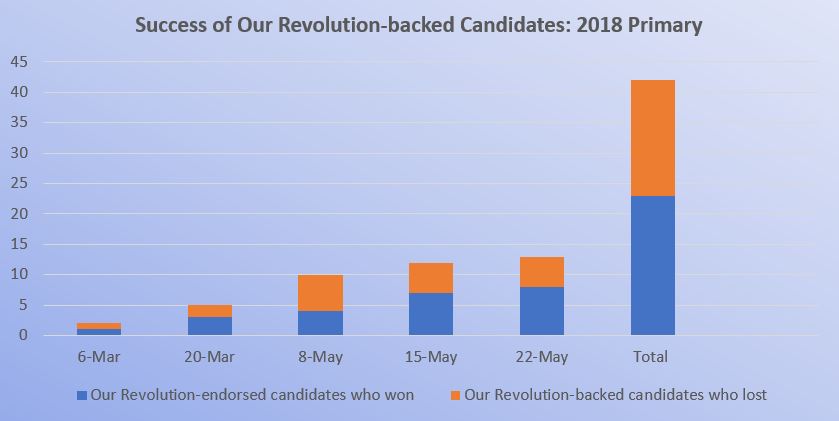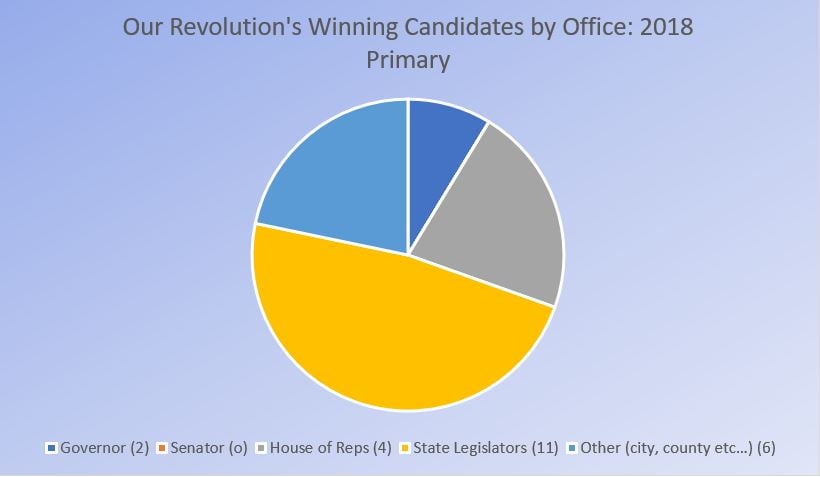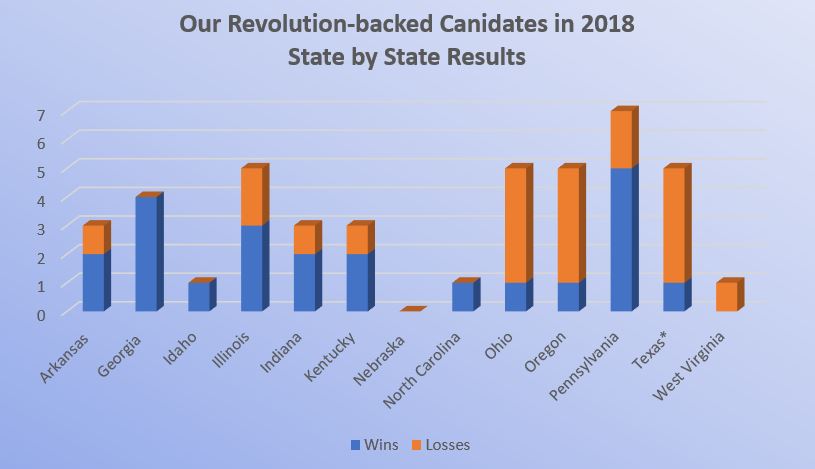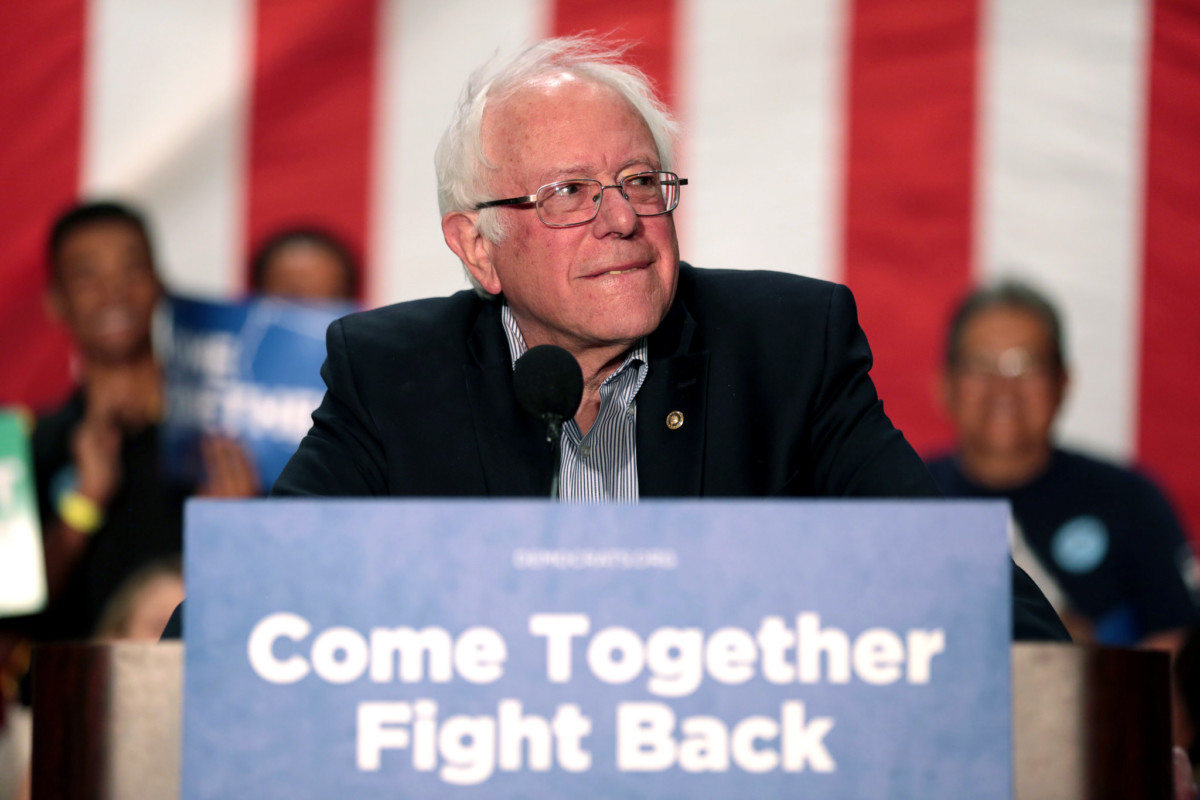Did you know that Truthout is a nonprofit and independently funded by readers like you? If you value what we do, please support our work with a donation.
In the middle of a promising primary season for progressives, establishment Democrats and the media are increasingly going on the offensive against challengers from the left. A recent article in Politico called “Bernie’s Army in Disarray” alleges that Our Revolution, the organization founded by Bernie Sanders, is “flailing,” “operating primarily as a promotional vehicle for its leader” and “has no major wins.”
The Politico article presents conflicting narratives. It portrays Our Revolution as toothless and inept on the one hand, but also as an existential threat to the Democratic Party on the other. If the former is true (as many in the dominant media have alleged of the organization and of Sanders) it is worth asking why power brokers in the Democratic Party feel so threatened by it. If the latter is true, then the group is functioning as it was designed: to build a down-ballot revolt to fundamentally change the Democratic Party and pivot it away from neoliberalism.
Some of the criticisms raised about Our Revolution are legitimate causes for concern. Two board members have recently resigned: Lucy Flores quit over concerns the organization ignored issues important to the Latino community and vice chair Catalina Velasquez quit days after the Politico article, citing the organization’s decision to hire Tezlyn Figaro, who has made offensive comments as recently as 2017.
“For the past month, we have been fighting divisive narratives targeting immigrants and pinning us against other oppressed peoples,” wrote Velasquez in a letter posted on social media. “I have faced this with little to no support from the organizational leadership.”
Figaro previously told Fox News that undocumented immigrants were “coming into the country and getting benefits that Americans do not get,” a dubious statement often made by anti-immigrant Republicans. Figaro has apologized, though if Twitter posts are any indication, many are not accepting it. (It is worth noting, many high-profile liberals were recently quite forgiving of Joy Reid’s past homophobic statements.)
Clearly, the organization has problems. This is unfortunate and has given fodder to right-wing critics. Still, these conflicts need to be put in perspective. In her letter, Velasquez also said the organization “is thriving,” and accused Politico of “lies” in its reporting. “May this moment be one of learning, and further investment in cross-community-solidary-building,” she said. Some progressives accused Politico of running a hatchet job aimed at marginalizing the organization.
Politico’s allegation that Our Revolution lacks “major wins,” for instance, is unsubstantiated and worth further scrutiny. Thirteen states have held primaries so far, and Our Revolution has endorsed 42 candidates in them. This is a reasonable sample size from which to draw from. Of those candidates endorsed by Our Revolution in 2018 primary races, 23 won and 19 lost.
The candidates’ successes have increased as the primary has unfolded. Our Revolution was one of two on March 6 and three of five for the March 20 primaries. On May 8, the organization endorsed 10 candidates and won four races. On May 15, there were 13 candidates endorsed by the group, and eight of them won. On May 22, they had eight victorious candidates, to five who lost (not including special elections or 2017 races).

Our Revolution is surely not the only variable in these races. Every race is unique and many other organizations, such as Brand New Congress, have endorsed some of these candidates as well. Still, the victories of candidates endorsed by Our Revolution counters the narrative that the organization is unsuccessful.
The early success of these candidates is especially significant given that they are often lacking in name recognition and running against entrenched incumbents with the support of corporations and the party’s major fundraising institutions: the Democratic National Committee (DNC), the Democratic Congressional Campaign Committee (DCCC) and the Democratic Senatorial Campaign Committee (DSCC).
“Our Revolution has kinks to work out as with any new organization, but it’s certainly not failing,” said Moumita Ahmed of Millennials for Revolution in an interview with Truthout. “[Our Revolution] came together to hold the Bernie grassroots together and support the work we’re doing on the ground … it has done a great job.”
Stronger Success Down the Ballot
Our Revolution’s only senatorial candidate to run so far lost to Senate incumbent Joe Manchin of West Virginia. It also lost a high-profile Ohio gubernatorial race with Dennis Kucinich against Robert Cordray. The group has had two gubernatorial candidates win their primaries, with Paulette Jordan in Idaho and Stacy Abrams in Georgia, the latter vying to be the first Black female to ever be a governor.
This is also of note because another common critique of Sanders and Our Revolution is that he has a “blind spot” on race, as Michael Arceneaux said in the Guardian, because he “still thinks class is more important than race.” Sanders has since tried to reach Black voters, as The Root reported on May 5. “I think he is beginning to understand that you’ve got to deal with race and class, not just class,” said Al Sharpton, the MSNBC host and civil rights activist, after meeting with Sanders.
Candidates for state and local offices make up the majority of winners backed by Our Revolution, accounting for 17 of its 23 victorious candidates. This is not surprising, given the organization’s emphasis on a “down-ballot movement.” In total, there are four Our Revolution-backed candidates who won a primary for the US House of Representatives, 11 state legislators and six city, county and municipal officials. Two gubernatorial candidates won.

Our Revolution fared especially well in the South, winning seven elections on May 22 and nine of 11 southern races overall during the primaries so far. They performed especially well in Georgia, where all four of the group’s endorsed candidates won. The states where they did the worst were Oregon, Ohio and Texas, where their combined record was 3-12.

Progress in Victory and Defeat
It is arguably an unfair metric to judge the organization by electoral wins alone. Our Revolution is supporting many underdog candidates with long odds. Senator Manchin, for instance, only gets 2 percent of his donations from small donors, according to data from the Center for Responsive Politics. His opponent, Paula Jean Swearengin, only had small donors and was outspent $2.4 million to $140,000, a 17-1 differential. In this sense, this “loss” was pretty impressive: Swearengin got 30 percent of the vote while facing a conservative incumbent in a red state.
The fruits of the down-ballot movement won’t all be immediate. The general theory is that, years down the road, after progressives take office at the local level, they will eventually move up the ballot.
“Electing people to the local level is the fastest way for people to move up and win state and national offices,” Anna Callahan, who founded The Incorruptibles to train candidates for down-ballot offices, told Truthout.
It is also worth noting that candidates who run and lose help serve the long-term goals of the down-ballot strategy. Like an army trying to siege a castle, some soldiers must weaken the gate before others can get through. They don’t get the spoils of the war or the name recognition, but they play a crucial role.
Snagging nearly a third of the vote against a Senate incumbent in West Virginia is quite an accomplishment, for instance, even though it is a blow-out at a glance. If Our Revolution sat the race out, they would have a higher winning percentage, but would they have made more progress?
The Establishment Strikes Back
As expected, the Democratic Party leadership is running “centrists” against progressive candidates far and wide. Their access to corporate money and their existing relationships with political and business leaders are big advantages. They have also been attacking these candidates with extreme fervor. “In one instance, the DCCC took the rare step of releasing damaging opposition research against a Democrat, Laura Moser, branding her a ‘Washington insider’ as she runs in a hotly contested primary in Texas,” USA Today reported.
Another disadvantage for the grassroots is a media narrative that won’t die: that Democrats must run to the center to win general elections. Time and time again, pundits and columnists explain that voters ought not to “worry about whether a candidate is progressive or centrist,” as Eugene Robinson recently wrote in The Washington Post. “Democrats have it too good to shoot themselves in the foot.”
This viewpoint is very much disputed. Have the Democrats learned nothing from the 2016 election, when voters from the left and right criticized centrist Democrats as the embodiment of establishment power? Democrats are campaigning like it’s 1992, when such an approach worked for President Clinton. Given the anti-establishment posture of the voting public, running centrist candidates backed with corporate money is likely to suppress turnout from the base. It is unlikely to appeal to Donald Trump’s voters either. “A powerful populist economic message will attract voters,” said Brad Bannon a Democratic pollster, in an op-ed for The Hill. “Personal attacks on Trump will distract people.”
From a report called “The Democratic Party in Crisis,” an “autopsy” of the party from Action for a Progressive Future says:
The Democratic Party’s claims of fighting for “working families” have been undermined by its refusal to directly challenge corporate power, enabling Trump to masquerade as a champion of the people. Democrats will not win if they continue to bring a wonk knife to a populist gunfight. Nor can Democratic leaders and operatives be seen as real allies of the working class if they’re afraid to alienate big funders or to harm future job or consulting prospects.
There is a reason Bernie Sanders is so popular. The party leadership, however, is clearly uncomfortable with this. There are many reports of ways the party is resisting or undermining candidates that share Sanders’s vision. The Intercept reported how Rep. Steny Hoyer, the 2nd ranked House Democrat, tried to dissuade Levi Tillemann, a progressive, from running against the party’s chosen candidate.
Hoyer explained that the DCCC has a “policy that early on, we’d try to agree on a candidate who we thought could win the general and give the candidate all the help we could give them.” This shows the party chose a candidate rather than allowing primary voters to make the choice. This was taped in a recording that The Intercept obtained, so Hoyer’s casual dismissive of the primary voters in the district is both jarring and impossible to deny.
In California, the DCCC also backed Laguna Beach businessman Harley Rouda over progressive scientist Hans Keirstead, even though Keirstead was endorsed by the California Democratic Party and Rouda was very recently a Republican. The Orange County Register reported that Rouda gave more than $9,000 in donations to Republicans from 1993-2007 and no money to Democrats.
“This isn’t the first race that D.C. insiders have meddled in,” said Keirstead in a fundraising email through DailyKos. “In New York, Texas and elsewhere, they’ve swooped in and tried to prop up their chosen ‘moderate’ candidates over strong progressive candidates.”
Millennials for Revolution issued a statement condemning the DCCC for undermining progressives. “The DCCC operatives lounge at their desks in Washington D.C., picking whom they want to run for office instead of listening to the grassroots organizers living in those districts,” the statement said.
In Michigan, Abdul El-Sayed, a gubernatorial candidate endorsed by Our Revolution, was sued for allegedly being unable to run due to his out of state voting record. El-Sayed’s campaign has called this a “birther tactic.” The courts in Michigan since dismissed the lawsuit. One of his opponents, Gretchen Whitmer, also has the benefit of Blue-Cross of Michigan asking its employees to vote for her. It is telling that the establishment backs the candidate who is in the pocket of health providers and is shunning the candidate pushing social democratic reforms like Medicare for All and statewide single-payer in Michigan.
These are just a few examples of the establishment trying to undermine any effort to change the party in Sanders’s image. One can trace this back to the proxy battle for DNC chair between Sanders supporter Keith Ellison, and the establishment (and eventual winner) Tom Perez.
Why Our Revolution Irks the Establishment
For many critics, the main concern is not that Our Revolution is ineffective, but that it has different goals than the Democratic Party. The fear is not that it will fail, but that it might work. The DC press doesn’t seem to understand the conflict. For instance, Politico critiques Our Revolution for not getting involved in races for centrist Democrats in special elections, like Doug Jones or Conner Lamb. These politicians do not share Sanders’s policy goals. Much of the Washington establishment and media seemingly won’t be happy unless Our Revolution becomes just one more fundraising arm of the party, only with Bernie Sanders’s seal of approval. Candidates backed by Our Revolution are pursuing some policies that confront Democratic neoliberal orthodoxies. If the organization started supporting every Democrat in a consequential race, with no regard for their positions on things like Medicare for All, it would be violating its own mission. It would also lose credibility with the left, where many are already skeptical of this strategy. They argue the Democratic Party is irredeemable. And that anything resembling “revolution” will have to take place from outside the existing power structure.
These early victories “raise the question of what left-wing candidates can accomplish inside the Democrats, even if they win,” writes Socialist Worker, “and what they give up by connecting themselves to a party that has always been a guardian of the status quo and the interests of America’s ruling class.”
Noam Chomsky, on the other hand, has expressed optimism for the down-ballot strategy and says it could break off the Democrats if needed. “These [down-ticket approaches] seem to me very sensible initiatives. That’s the way to build an authentic political movement, and it’s not entirely within the [Democratic] party. If it really grows, and the bureaucrats block it, it can take off independently,” Chomsky said in a previous interview with Truthout. “I’ve been urging something like this for a long time, as have many others. There have been some good steps in this direction, but the Sanders momentum might make a big difference.”
Meanwhile, some activists are just happy to see progress. “[Four] years ago did anyone imagine we would have socialists winning office all over the country?” said Ahmed in a Facebook post.
The future of Our Revolution is uncertain. It faces powerful opponents, negative press and some self-inflicted wounds. Still, the intense establishment and media backlash against Our Revolution — coupled with success at the ballot — suggests the organization just might be doing something right.
Press freedom is under attack
As Trump cracks down on political speech, independent media is increasingly necessary.
Truthout produces reporting you won’t see in the mainstream: journalism from the frontlines of global conflict, interviews with grassroots movement leaders, high-quality legal analysis and more.
Our work is possible thanks to reader support. Help Truthout catalyze change and social justice — make a tax-deductible monthly or one-time donation today.
